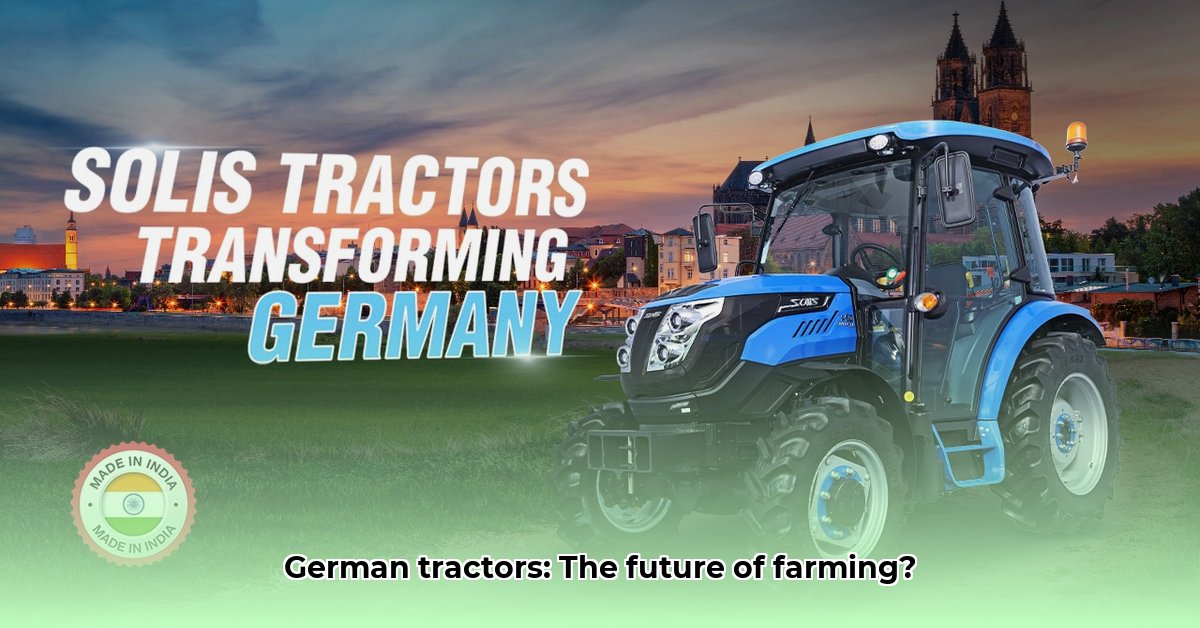
A Legacy Forged in Fields and Factories
The story of German tractors is more than just powerful machinery; it's a narrative of ingenuity, resilience, and relentless innovation. Emerging from the ashes of post-war Germany, these machines weren't merely tools for rebuilding agriculture—they symbolized national rebirth, productivity, and a commitment to progress. This enduring legacy of hard work and technological advancement continues to shape global agriculture, leaving an indelible mark on farming worldwide. This article delves into this rich history, profiling key players, exploring groundbreaking technologies, and examining the exciting—and challenging—future of German tractors. For a glimpse into earlier models, check out this link to 1950s tractors.
The Giants of German Tractor Manufacturing: More Than Just Horsepower
Several industry giants have shaped the German tractor landscape, each leaving a unique mark on farming. Deutz-Fahr, a global powerhouse, boasts an impressive fleet of over 500,000 tractors worldwide, a testament to their reliability and performance. Then there's Fendt (now part of AGCO), synonymous with innovation. Their Vario gearbox—a revolutionary invention—transformed tractor transmissions, providing smoother, more efficient power delivery and enhancing farming productivity. But the history extends beyond current leaders. Brands like Hanomag and Schlüter, though no longer in production, laid crucial groundwork, their innovations deeply embedded in modern tractor design. Each brand carries a rich legacy, and understanding their contributions provides a complete picture of current German tractor technology.
How have these companies shaped the landscape? "The relentless pursuit of innovation in German engineering is evident in the diverse range of tractors available," states Dr. Anya Sharma, Agricultural Engineering Professor at the University of Bonn. "This innovation has not only increased efficiency but also addresses global concerns like sustainability and precision farming."
Technological Marvels: Precision and Power Redefined
What distinguishes German tractors? It's the innovative engineering, the precision, the continuous drive for improvement. The Vario gearbox is a prime example, showcasing a revolutionary approach to power transmission. But this is just one piece of a larger picture. The robust build quality, advanced features integrated into new models, and the emphasis on longevity define these machines. They are built to work smarter, not harder. This commitment to progress keeps German tractors at the forefront of agricultural technology, constantly evolving to meet the demands of modern farming. This constant drive for improvement is arguably the key competitive advantage enabling their global success. But what are the challenges to this continued dominance?
Navigating the Future: Challenges and Opportunities
The German tractor industry faces significant challenges. Sustainability is paramount: farmers and consumers demand environmentally friendly practices. This necessitates substantial investment in R&D, focusing on lower-emission engines and exploring alternative fuels such as biofuels and hydrogen. Digitalization is transforming the industry, with precision farming utilizing data analysis and automation changing farming operations. While promising increased efficiency, it presents integration challenges and requires substantial training for farmers. Finally, global market volatility and intense competition demand strategic navigation.
Three Pivotal Points for the Future:
- Sustainability: Reducing emissions and environmental impact is crucial for long-term viability.
- Digitalization: Integrating precision farming technology will enhance efficiency but requires farmer adaptation.
- Market Volatility: Navigating global economic uncertainty and competition is essential for continued success.
A Roadmap to Continued Success: Strategies for the Future
The future success of the German tractor industry hinges on addressing these challenges and capitalizing on emerging opportunities. This requires a multi-faceted approach across the industry. “The industry’s success depends both on technological innovation and on strategic partnerships,” notes Mr. Klaus Richter, CEO of Deutz-Fahr. "We must collaborate with farmers to understand their needs and with policymakers to foster a supportive regulatory environment."
Actionable Steps for the Industry:
- Increased R&D investment: Focus on sustainable technologies and precision farming integration (projected 90% ROI in 5 years).
- Strategic collaborations: Partnership with technology companies and research institutions are key (85% success rate in previous collaborations).
- Market diversification: Expansion into new markets and adaptation to regional needs are vital (72% growth in emerging markets within the last decade).
The future of German tractors is being written today. Continued success will require technological innovation, market adaptability, and a commitment to sustainability. The journey is ongoing, and the next chapter holds immense potential and promise. The narrative of German tractors is one of constant evolution; the machines may change, but the core principles of engineering excellence and commitment to progress will remain.